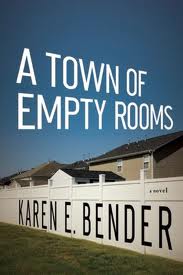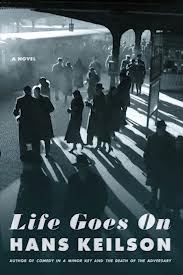Friday Finds for Writers
 Writing-related resources, news, and reflections to read over the weekend.
Writing-related resources, news, and reflections to read over the weekend.
Have a great weekend, everyone. See you back here on Monday!
 Writing-related resources, news, and reflections to read over the weekend.
Writing-related resources, news, and reflections to read over the weekend.
Have a great weekend, everyone. See you back here on Monday!
 My e-mailbox recently offered a lovely surprise: a message from Jennifer Barber, whose name was familiar to me from Salamander, the fine literary journal that she edits from Suffolk University in Boston. She was writing to let me know about her latest poetry collection, Given Away, which was published by Kore Press, and to offer me a complimentary copy, which I gladly accepted.
My e-mailbox recently offered a lovely surprise: a message from Jennifer Barber, whose name was familiar to me from Salamander, the fine literary journal that she edits from Suffolk University in Boston. She was writing to let me know about her latest poetry collection, Given Away, which was published by Kore Press, and to offer me a complimentary copy, which I gladly accepted.
The book’s cover bears a blurb from Vijay Seshadri, describing Given Away as a collection of “beautiful and rigorous poems.” I’d agree. I can’t help sensing that I should reread this book many times, that I haven’t even begun to absorb the deep meanings embedded in these challenging pieces.
Some of the poems that have gripped me most strongly are those with fairly clear Jewish connections. Take, for example, “nefesh,” which was also published in Harvard Divinity Bulletin. Or “A Poet of Medieval Spain,” which appeared first Cerise Press. In a note, Barber explains that this poem “draws on Peter Cole’s anthology The Dream of the Poem: Hebrew Poetry from Muslim and Christian Spain, 950-1492 (Princeton: Princeton University Press, 2007) to imagine an anonymous poet of 12th century Andalusia.”
I’m grateful to Jennifer Barber for offering me this introduction to her work (and for the especially generous inclusion of a sample copy of Salamander in the package she mailed to me). I look forward to spending even more time with her poems.
 I jumped at the chance to read a complimentary advance copy of Karen E. Bender‘s second novel, A Town of Empty Rooms. Although I have yet to read Bender’s acclaimed first novel, Like Normal People (2000), one of her short stories, “Candidate,” stayed with me long after I read it. And certain details about the new novel, which features a Jewish protagonist in North Carolina, resonated with my experience/interests.
I jumped at the chance to read a complimentary advance copy of Karen E. Bender‘s second novel, A Town of Empty Rooms. Although I have yet to read Bender’s acclaimed first novel, Like Normal People (2000), one of her short stories, “Candidate,” stayed with me long after I read it. And certain details about the new novel, which features a Jewish protagonist in North Carolina, resonated with my experience/interests.
In essence, the book traces three major connected conflicts. First, there’s the marital dissatisfaction between protagonist Serena Hirsch and her husband, Dan Shine. Among the problems this nominally Jewish couple faces is a curious development that follows their move from New York to Waring, N.C. (a move prompted by a serious misdeed on Serena’s part): Serena is pulled to join the sole local synagogue, Temple Shalom, whereas Dan resists even setting foot in the place.
Next, there’s the outsider experience of Serena and Dan in their new hometown, where ubiquitous billboards proclaim messages along the lines of “Jesus says: I will make my home with you.” Serena and Dan’s son, Zeb, is the only Jewish child in his public kindergarten; it isn’t long before another kindergartner throws pennies at Zeb, commanding him to pick them up. Zeb, thinking the other boy his friend, complies. “Ryan had laughed at him, and said ‘See? See?’ and said to a group of kids, ‘I told you he’d pick them up.'” One infers that the episode is especially painful for Serena, whose recently-deceased father was a child emigrant from Nazi Germany.
Finally, there’s the intramural discord within Temple Shalom, conflict surrounding the charismatic yet unconventional Rabbi Josh Golden. Embedded within the not-always-admirable behavior depicted here are serious questions about the complicated meanings of religious policies and practice and the roles and responsibilities of spiritual leaders.
In short, there is a great deal to absorb and consider as one reads this novel. Karen E. Bender has set the bar high here, attempting to depict and explore the souls of individuals and communities. The result is a novel well worth reading.
Side note for fiction fans: Karen Bender and Aimee Bender, who helped launch Tablet magazine’s fiction feature in September of this year, are sisters.

Shabbat shalom.
 You were all so incredibly kind about and interested in my previous “case study” post. So when my latest book review (of Damion Searls’s translation of Life Goes On, the first novel by Hans Keilson), appeared in The Forward last week, I thought that you might similarly welcome some potentially instructive background. That’s why I’m sharing the text below, which reproduces most of my initial e-mail message seeking the assignment.
You were all so incredibly kind about and interested in my previous “case study” post. So when my latest book review (of Damion Searls’s translation of Life Goes On, the first novel by Hans Keilson), appeared in The Forward last week, I thought that you might similarly welcome some potentially instructive background. That’s why I’m sharing the text below, which reproduces most of my initial e-mail message seeking the assignment.
I say “most” because when I sent this pitch last summer, The Forward‘s arts coverage was in transition. Ultimately, I sent this pitch to both the managing editor (the former arts & culture editor) and the newly assigned arts & culture editor. I’d corresponded with both of these individuals before, so there were some personalized greetings that I’m omitting in the text below. (more…)